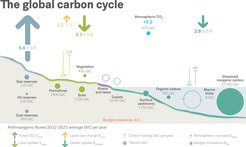No sign of a decline in global CO2 emissions
The most recent report from the Global Carbon Project shows that fossil carbon dioxide emissions will be 36.6 billion metric tons of CO2 worldwide by the end of 2022, slightly higher than before the Corona pandemic.
Together with land use emissions of 3.9 billion metric tons, total emissions will be 40.6 billion metric tons. This figure is only slightly lower than the highest levels seen so far in 2019 (40.9 billion metric tons). If emissions continue at this high level, the remaining carbon budget to comply with the 1.5°C limit will already be used up in around nine years.
The Global Carbon Project publishes an annually updated status on the development of the global carbon cycle. For the current year, CO2 emissions will be a little higher than before the pandemic and thus only slightly below the peak value of 2019.
These continued high emissions are at odds with the decline that would be needed to meet the Paris climate goals. To limit global warming to 1.5°C with a 50% probability, a total of only 380 billion metric tons of CO2 may be emitted. Assuming the emission levels of 2022, this amount will already be reached in about nine years.
Climate policy and technological change are not yet sufficiently effective

The report shows that the long-term growth in fossil emissions has slowed. Twenty-four countries with growing economies have reduced their fossil CO2 emissions, but to reach zero CO2 emissions by 2050, total anthropogenic CO2 emissions would need to be reduced by an average of 1.4 billion tons of CO2 per year. This is comparable to the observed decline in emissions in 2020 due to the COVID-19 pandemic, indicating the scale of action required.
The forecast increase in fossil CO2 emissions in 2022 is primarily due to higher oil consumption as a result of the renewed rise in air traffic. Regional differences are clearly noticeable here. For example, emissions in 2022 will decrease by around 0.9% in China and by 0.8% in the European Union compared with 2021. In other regions, however, they will increase: in the United States by 1.5%, in India by 6%, and in the rest of the world by 1.7%.
"Emissions remain worryingly high, and despite some positive developments, they are far from putting us on a path to stabilizing the climate at 1.5°C," says Prof. Dr. Sönke Zaehle, director at the Max Planck Institute for Biogeochemistry and co-author of the study.
Tropical deforestation causes high emissions
In addition to fossil emissions, emissions from land use also have a major impact on the global carbon balance. They are estimated to be 3.9 billion metric tons of CO2 this year and occur primarily in tropical regions. Indonesia, Brazil and the Democratic Republic of Congo together accounted for 58% of global land use emissions in the last decade.

The report also records the fate of anthropogenic CO2 emissions in natural sinks. For 2022, the scientists estimate the CO2 uptake of the ocean at 10.5 billion tons and the land sink at 12.4 billion tons. The high annual variability of the land sink in particular is caused by climate variability and shows that these sinks react strongly to changes in the climate. The remaining nearly half of total emissions continue to raise atmospheric CO2 concentrations, to 51% above their pre-industrial levels.
"The future development of the land and ocean sinks and possible effects of climate change are therefore a major factor in the future development of atmospheric CO2 concentrations, in addition to future emissions," Prof. Zaehle concludes.
The report on the Global Carbon Budget is prepared jointly by more than 100 scientists on the basis of data from global measurement networks, satellite data, statistical surveys and model calculations. In addition to the Max Planck Institute for Biogeochemistry (Jena), scientists from Germany, Austria and Switzerland are involved from the Alfred Wegener Institute (Bremerhaven), the Ludwig Maximilian University (Munich), the Max Planck Institute for Meteorology (Hamburg), the Karlsruhe Institute of Technology, the GEOMAR Helmholtz Centre for Ocean Research (Kiel), the Leibniz Institute for Baltic Sea Research (Warnemünde), the International Institute for Applied Systems Analysis (Laxenburg), ETH Zurich and the University of Bern. The Global Carbon Budget 2022 is the 17th edition of the annual peer-reviewed report.
(Adapted press release of the LMU Munich for the Global Carbon Project)













